When it comes to traits that are strongly correlated to good psychological health and overall well-being, one of the most influential is self-esteem.
High self-esteem is strongly correlated with better outcomes in relationships, school, work, mental health, physical health, and a reduction in antisocial behavior.[1] Yet, despite its proven benefits, there has been much debate over the years about the best ways to support teens and adults to improve their self-esteem.
In this article, we’ll give a brief overview of what coaches, counselors, and therapists need to know about self-esteem. Then, cover a range of self-esteem worksheets and activities that can be used with clients.
Self-Esteem 101
Self-esteem can be defined as:
“An individual’s subjective evaluation of his or her worth as a person.”[2]
The ways high or low self-esteem might show up in individuals can vary. So to give you an idea of what to look for in clients, we’ve listed a few examples below.[3]
| Signs of High Self-Esteem | Indicators of Low Self-Esteem |
|---|---|
| A person appreciates themselves and others | Negative image of self and other people |
| Handles criticism without taking it personally | Finds any form of criticism very upsetting |
| Open to taking risks and accepting failure | Cautious about trying new things due to fear |
| Lives life according to clear personal values | Lacking a sense of direction and meaning |
| Sustains healthy and respectful relationships | Poor boundaries and communication skills |
| Good personal problem-solving skills | Has difficulty navigating life challenges |
How are Narcissism and Self-Esteem Related?
Self-esteem boosting activities have been criticized in the past for encouraging narcissism. But recent research indicates that the two concepts are quite different.
“Narcissism is a personality trait characterized by a sense of superiority and a desire for respect and admiration from others.”[4] While self-esteem is based on an internal feeling of worthiness that’s not dependent on superiority or external approval.
This means that as long as self-esteem activities in therapy and coaching are focused on cultivating internal self-worth, coaches and therapists need not worry that they are promoting narcissism in clients.
Importance of Worksheets for Self-Esteem
Self-esteem boosting activities have successfully been used in traditional therapy and coaching settings for decades. Considering the personal nature of the topic, 1:1 work is often undertaken in combination with self-esteem worksheets for teens and adults.
With the increasing trend toward online therapy, evidence has emerged that even all-digital app-based approaches can be effective in helping people with changing personality traits, like self-esteem.[5]
This suggests that platforms like Quenza—which streamlines the use of a wide variety of electronic worksheets—can be effectively utilized by practitioners of all backgrounds to deliver high-quality self-esteem boosting programs.
To give you an idea of how that might look in your practice, here’s an overview of our 6 favorite self-esteem worksheets.
Self-Esteem Worksheets for Teens (+ Printable PDF)
Adolescence is often identified as an ideal time to work on self-esteem.
During the teen years, the steady increase in self-esteem typically seen during childhood can start to plateau, or even reduce. But interestingly, research shows that teens are generally more responsive than other age groups to self-esteem boosting activities.[1]
Here are 2 self-esteem boosting worksheets that are ideal to use as therapy activities for teens of any age.
Creating a Positive Body Image
Poor body image in teens is a risk factor for low self-esteem. And it’s also associated with mental health conditions like depression and disordered eating.[6]
In the Quenza app, we have an activity to help teens create a positive body image that pairs an educational video with 5 downloadable and printable self-esteem worksheets in PDF.
The activity starts with a video, explaining the benefits of considering your body in the context of its many useful and amazing functions, not just focusing on appearance.

Once this concept has been introduced, users are automatically sent 5 self-esteem worksheets for teens over the following weeks.
Here are some screenshots from the first worksheet, titled “What Can Your Body Do?”
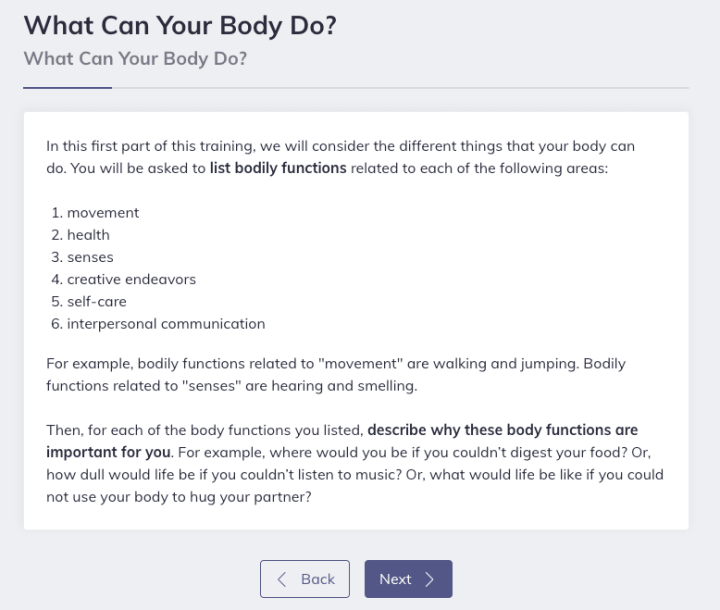
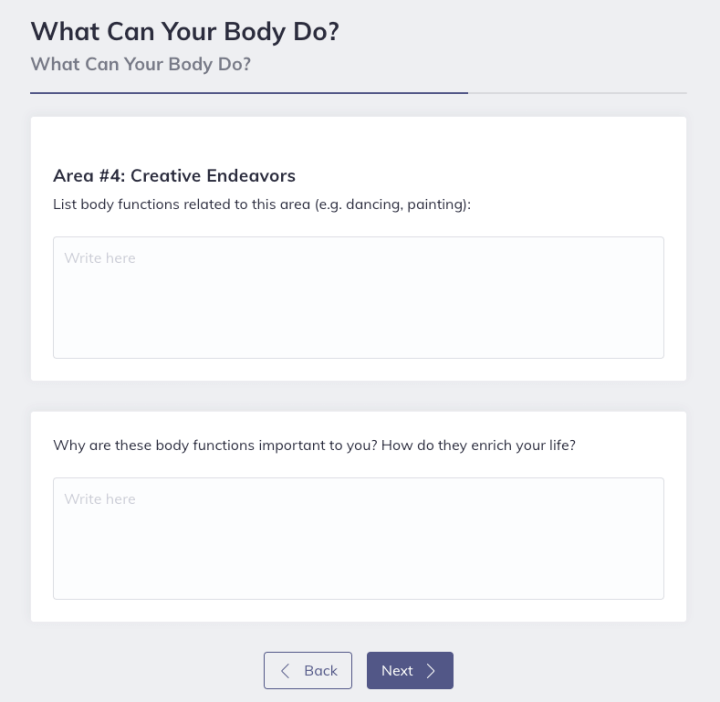
Learning to Say “No”
Adolescents with low self-esteem tend to struggle with saying “No” to peer pressure more than those with a higher sense of self-worth. This can place teens in challenging, sometimes even dangerous situations. They may end up making choices that go against their values out of a desire to fit in or not disappoint their friends.
We teach teens how to say “No” in Quenza with a seven-step expansion based on self-esteem therapy worksheets. A customizable, pre-made template of the worksheets is available in Quenza’s Expansion library. And you can get full access right now with a free Quenza trial.
The 7 steps in the Learning to Say “No” Expansion are:
- Tapping into your values
- Separate the request from your relationship
- Say no without saying the word “no”
- Focus on what you will gain by saying “no
- Recognize the personal cost of saying “yes”
- Opt for being respected over being popular
- Be clear rather than vague and non-committal
Here’s the introduction for the Learning to Say “No” self-esteem exercises for youth.
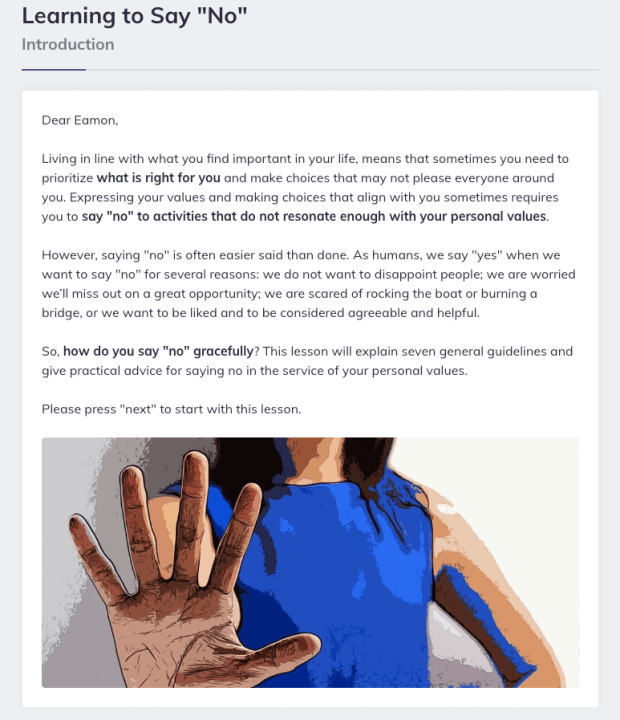
And part of the worksheet for step 5.
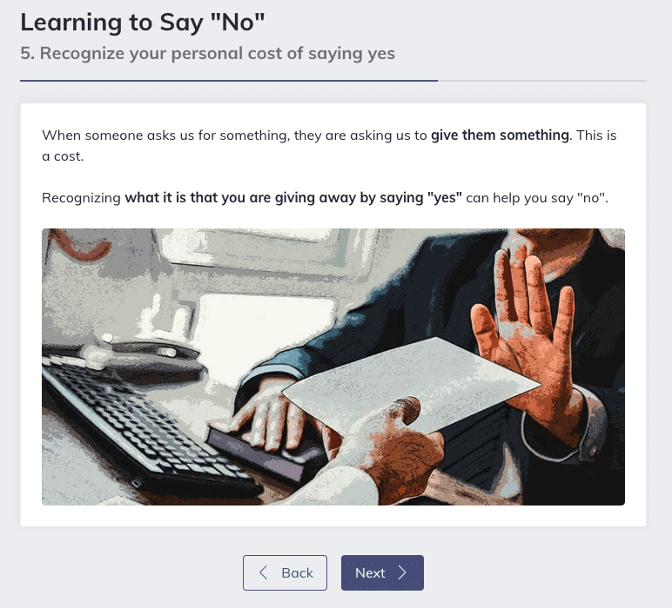
Self-Love Building Worksheets: Middle Schoolers & Elementary Students
In middle schoolers and elementary students, high-self esteem is linked to better interpersonal relationships, improved coping skills, and greater academic achievement.[7]
However, the challenge with delivering self-esteem activities for middle schoolers is making them adaptable for multiple age groups.
Perhaps the most flexible self-esteem activities for elementary students and middle schoolers are self-love sentence stems.
Self-Love Sentence Stems
Self-love sentence stems are great because the prompts and instructions you give to children can be adjusted to different age groups.
For example, with younger children, you might do the activity verbally, guided by self-love worksheets PDFs, like this.
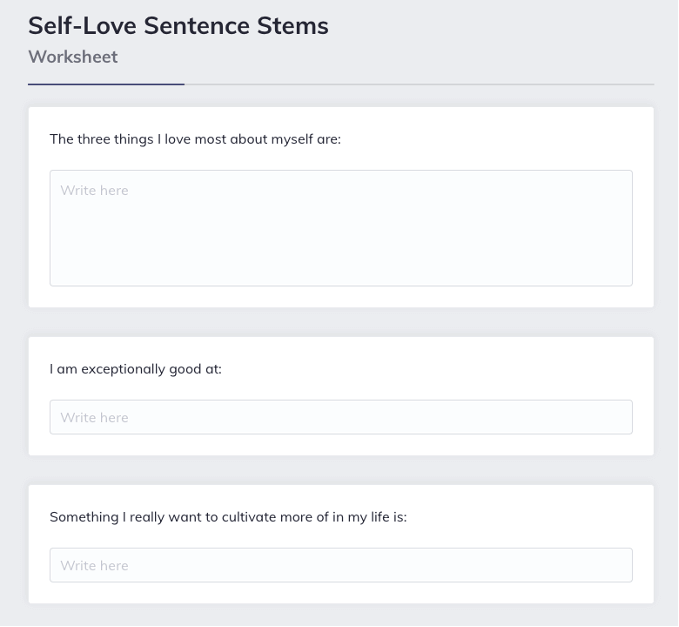
Or with older children who are confident in writing, you can ask them to write out sentence stems independently, from a printable self-esteem worksheets PDF, as detailed below.

CBT Self-Esteem Activities for Adults
CBT worksheets for adults can be useful for managing a variety of cognitive distortions that might lead to feelings of low self-worth.
Some examples of cognitive distortions covered in the Quenza activity library include labeling, magnification and minimization, all-or-nothing thinking, fortune telling, and many more.
Let’s take a look at the labeling Activity in the app.
Unhelpful Thinking Styles – Labeling
Many people with low-self esteem ascribe negative labels to themselves, like fat, unintelligent, undisciplined, or even unlucky.
To help unwind some of these unhelpful thinking styles, we begin with an overview of the cognitive distortion.
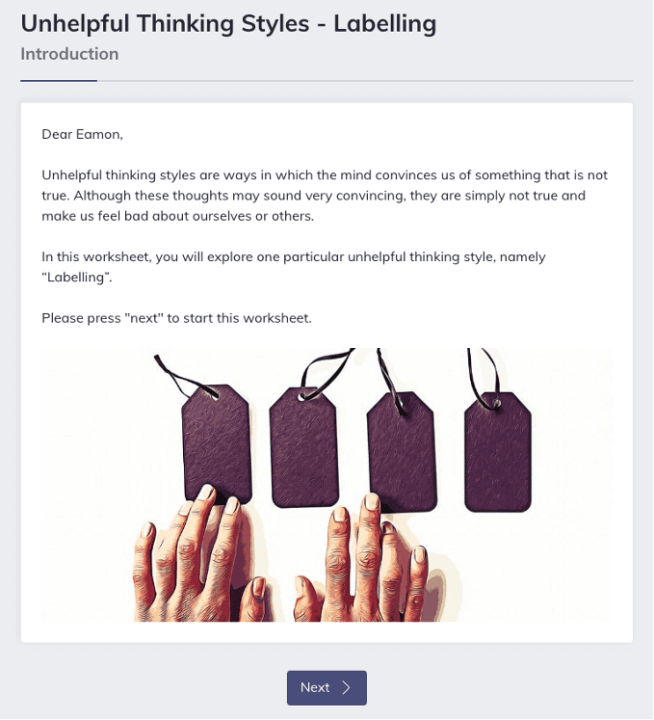
Followed by self-esteem worksheets for adults that clients can use independently, or with a therapist or coach.
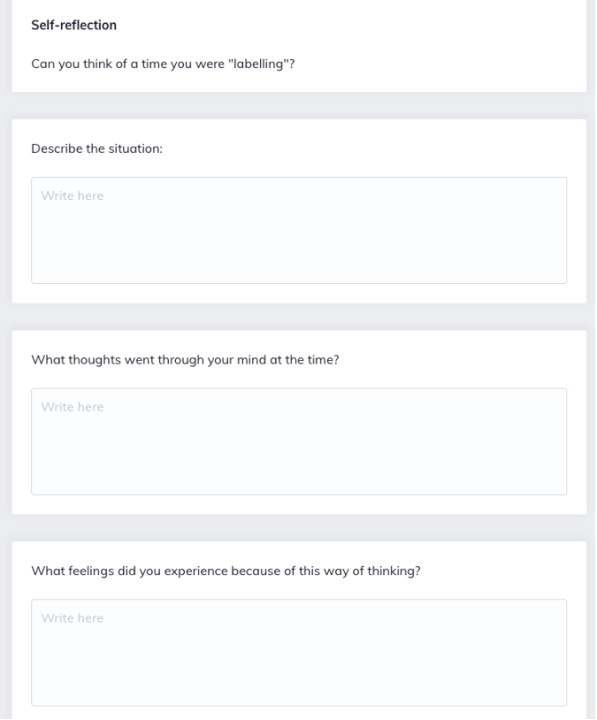
2 Exercises for Boosting Self-Esteem In Therapy
Low self-esteem has been linked to mental health challenges as diverse as depression, eating disorders, anxiety, and substance abuse. So it’s no surprise that self-esteem activities in therapy are often recommended as a “broad-spectrum approach for mental health promotion.”[8]
Two issues related to self-esteem that can successfully be addressed in therapy are personal values and acceptance.
Here are some self-esteem therapy worksheets for each topic.
Values Vision Board
When people know what’s important to them and live their life accordingly—they tend to have a stronger sense of self-worth and self-esteem.
A values vision board is a great way to help clients gain clarity around their values, so they can start living a more aligned life.
The activity starts with an explanation of why values are important.

Followed by practical instructions on putting together a vision board.

And finishing with self-esteem building worksheets that help people clarify their values, and explore how they might be able to live more in line with them.
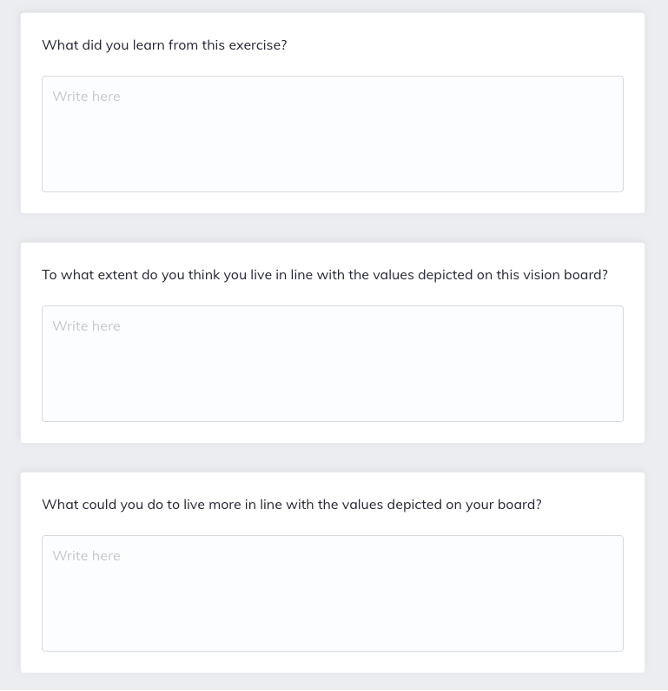
The Acceptance of Avoidance Route
Unfortunately, making life changes based on personal values can often be incredibly difficult—especially for someone who’s been living out of alignment for some time.
For example, you could have a client who decides they need to quit their job, break up with a partner, or move overseas because of their new-found values. These are all big, scary changes!
A great way to support clients through this process is by exploring the concepts of acceptance, avoidance, and fear.
Here are some self-esteem therapy worksheets on both topics in your practice right now, all of which you can access with a free Quenza trial.
Avoidance
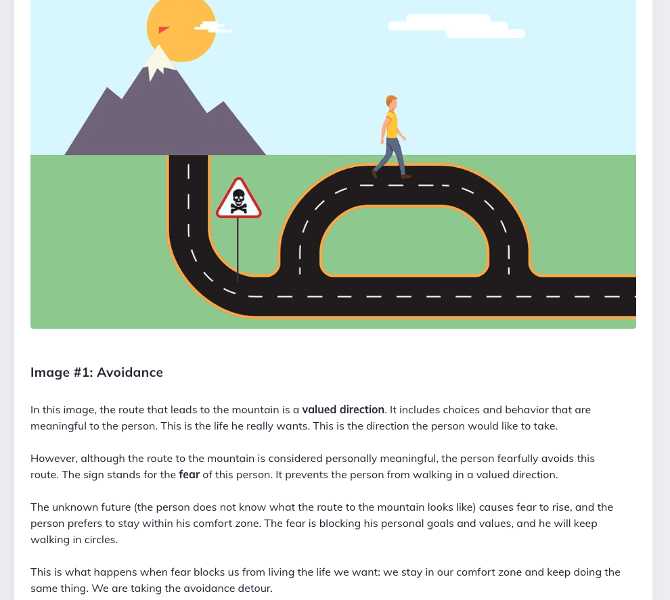
Acceptance

Printable Self-Esteem Worksheets (PDF)
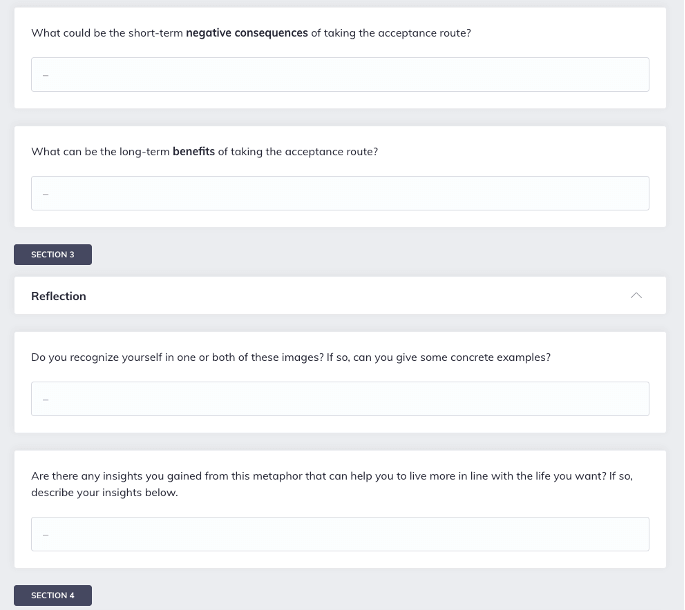
Building A Self-Confidence Improvement Program: 5 Steps
Without a healthy sense of self-confidence, people will have difficulty taking action and achieving goals. And over time, missed growth opportunities can lead to a poor sense of self-worth.
Self-confidence comes from a combination of knowing and doing. So to develop an effective confidence coaching program—it’s important to encompass both theoretical and practical elements.
Quenza enables coaches and therapists to easily create custom-built self-confidence improvement programs with our innovative Pathways system.
A Pathway is a collection of activities (like the ones we’ve discussed in this article), which are given to a client to work on a particular issue.
So, to help a client build self-confidence, you could prescribe a 5 step pathway including:





When you group a collection of activities like these together in the Quenza app, you can send it to a client and it will show up in the “Pathways” section of their dashboard.
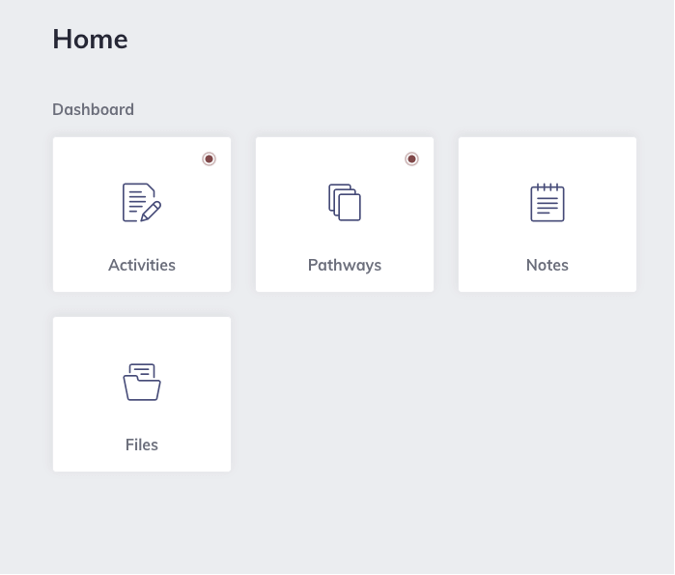
Integrating Self-Esteem Practices into Daily Routine
Building and maintaining self-esteem is not a one-time task but a continuous process that benefits from daily practice. Integrating self-esteem exercises into your daily routine can significantly enhance your sense of self-worth and confidence.
Start by setting aside a few minutes each morning for a brief self-reflection session. Use this time to fill out a worksheet or simply write down three positive affirmations. Throughout the day, practice mindfulness and positive self-talk. Catch yourself when negative thoughts arise and consciously replace them with positive affirmations.
Incorporate gratitude exercises into your evening routine; reflect on the day’s achievements and express appreciation for the good things that happened. These small, consistent efforts can compound over time, leading to a significant boost in self-esteem. By making these practices a part of your daily routine, you create a positive feedback loop that reinforces your self-worth and encourages continuous personal growth.
The Role of Self-Esteem in Mental Health
Self-esteem plays a pivotal role in mental health, influencing how we perceive ourselves and interact with the world. High self-esteem contributes to a positive outlook on life, better stress management, and a lower risk of mental health issues such as depression and anxiety.
When we feel good about ourselves, we are more likely to take on new challenges, form healthy relationships, and pursue our goals with confidence. Conversely, low self-esteem can lead to self-doubt, negative self-talk, and a reluctance to engage in social or professional opportunities. It can also exacerbate feelings of loneliness and inadequacy.
By using self-esteem worksheets and other tools to build self-worth, individuals can foster a healthier mental state. These tools encourage positive thinking patterns, help set realistic goals, and provide a structured way to recognize personal achievements. Ultimately, improving self-esteem is a proactive step toward better mental health and overall well-being.
Final thoughts
Self-esteem is one of the most beneficial psychological traits a person can possess. It can impact work, relationships, goal attainment, mental health, academic achievement, and much more.
Because self-esteem spans a number of domains, it can be difficult for coaches and therapists to cover everything clients need to know in 1:1 sessions. For that reason, many practitioners use self-esteem worksheets alongside individual work, or sometimes even as a standalone program.
Quenza contains dozens of ready-to-use self-esteem worksheets that you can share seamlessly with clients. Each one is customizable, and you can even package them together in sequence as a tailor-made pathway designed specifically for your client’s needs.
To see how Quenza can help you work with clients with self-esteem issues today, sign up for a one-month full-access free trial of the Quenza app.
Frequently Asked Questions
The time frame for seeing improvements in self-esteem can vary greatly depending on individual circumstances, consistency of practice, and the severity of self-esteem issues. Generally, some people may notice small improvements within a few weeks of regular use. However, significant and lasting changes in self-esteem often take several months of consistent effort. It’s important to approach self-esteem work as an ongoing process rather than a quick fix.
Yes, many of these worksheets can be adapted for group therapy settings. Activities like the Values Vision Board or Self-Love Sentence Stems can be particularly effective in groups, allowing for shared experiences and peer support. However, therapists should be mindful of privacy concerns and group dynamics when using more personal exercises in a group setting.
Cultural background can significantly influence how individuals perceive and work on self-esteem. Some cultures may prioritize collective worth over individual self-esteem, which could affect how certain exercises are received. It’s crucial for therapists and coaches to be culturally sensitive, possibly adapting the language or focus of the worksheets to align with the client’s cultural context. For instance, exercises focusing on individual achievements might need to be balanced with those acknowledging community contributions in some cultures.
While generally beneficial, there are some considerations to keep in mind. For individuals with severe self-esteem issues or underlying mental health conditions, worksheets alone may not be sufficient and could potentially reinforce negative thought patterns if not properly guided. It’s important that these tools are used under the supervision of a qualified professional who can provide context, support, and additional interventions if needed.
Parents and educators can integrate self-esteem worksheets into daily or weekly routines. For younger children, activities like Self-Love Sentence Stems can be turned into fun, conversational games. For teens, parents might consider setting aside time for joint completion of worksheets, fostering open discussions about self-worth. Educators could incorporate elements of these exercises into class activities or counseling sessions. The key is to create a supportive, non-judgmental environment where young people feel safe exploring and expressing their feelings about themselves.
References
- ^ Orth, U., & Robins, R. W. (2022). Is high self-esteem beneficial? Revisiting a classic question.American Psychologist, 77(1), 5–17. https://doi.org/10.1037/amp0000922.
- ^ Donnellan, M. B., Trzesniewski, K. H., & Robins, R. W. (2011). Self-esteem: Enduring issues and controversies. In T. Chamorro-Premuzic, S. von Stumm & A. Furnham (Eds.), The Wiley-Blackwell handbook of individual differences (pp. 718-746). Chichester, UK: Wiley-Blackwell. https://onlinelibrary.wiley.com/doi/10.1002/9781444343120.ch28
- ^ Ackerman, C. (2018). What is Self-Esteem? A Psychologist Explains. Retrieved from https://positivepsychology.com/self-esteem/
- ^ Brummelman, E., Gürel, Ç., Thomaes, S., & Sedikides, C. (2018). What Separates Narcissism from Self-esteem? A Social-Cognitive Perspective. DOI:10.1007/978-3-319-92171-6_5
- ^ Stieger M, Flückiger C, Rüegger D, Kowatsch T, Roberts BW, Allemand M. Changing personality traits with the help of a digital personality change intervention. Proc Natl Acad Sci U S A. 2021 Feb 23;118(8):e2017548118. PMCID: PMC7923371 DOI: 10.1073/pnas.2017548118
- ^ Bucchianeri, M. M., Arikian, A. J., Hannan, P. J., Eisenberg, M. E., & Neumark-Sztainer, D. (2013). Body dissatisfaction from adolescence to young adulthood: findings from a 10-year longitudinal study. Body image, 10(1), 1–7. https://doi.org/10.1016/j.bodyim.2012.09.001
- ^ Haney, P., & Durlak, J. A. (1998). Changing self-esteem in children and adolescents: a meta-analytic review. Journal of clinical child psychology, 27(4), 423–433. https://doi.org/10.1207/s15374424jccp2704_6
- ^ Mann, M., Hosman, C. M., Schaalma, H. P., & de Vries, N. K. (2004). Self-esteem in a broad-spectrum approach for mental health promotion. Health education research, 19(4), 357–372. https://doi.org/10.1093/her/cyg041



